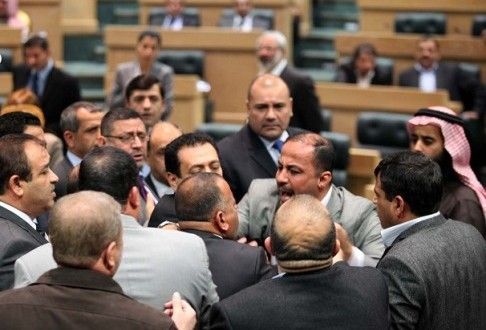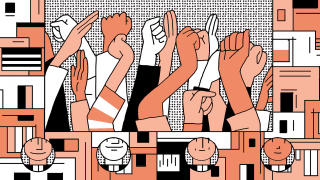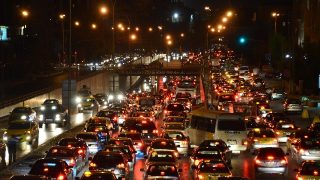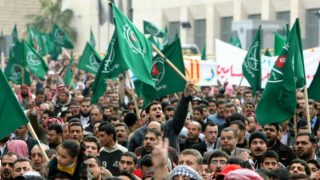Date: September 10, 2013.
Place: Jordanian House of Representatives.
Incident: An MP storms into the House of Representatives brandishing a Kalashnikov. Democratic debate is temporarily suspended as he uses two bullets to end an ongoing dispute with another member of parliament.
At the session prior to the Kalashnikov incident, on September 8, 2013, the king of parliamentary brawls, MP Yahia Al-Saud, had interrupted Jordanian Prime Minister Abdulla Ensour every time he spoke. The interruptions led MP Qusay Al-Damissi to shout angrily at Al-Saud to shut up. Al-Saud and Al-Damissi then traded insults. At that point, MP Talal Al-Sharif jumped in on Al-Saud’s side, even though the argument had absolutely nothing to do with him. Al-Sharif, who had not responded to earlier insults from fellow MPs, commandeered the dispute and ended up threatening Al-Damissi that he would use weapons.
Al-Sharif made good on his threat, later firing two AK-47 rounds at his target without hitting him. Though they missed, these two bullets have settled the matter of the legitimacy of the seventeenth session of Parliament’s lower House of Representatives, voted in on January 23, 2013, without a majority, and following an election boycotted by opposition parties including the Islamic Action Front (IAF), the political wing of the Muslim Brotherhood in Jordan. The elections have been described as rigged. The results of a study carried out by the Center for Strategic Studies at the University of Jordan on February 20, 2013 claimed that only 28% of people had believed that this parliament would be better than the one it had replaced, which was dissolved by the Jordanian monarch to appease popular anger.
Then disaster struck with bullets in parliament. MPs felt that this was a critical test for the future of the lower house, especially as the king has the power to dissolve parliament and call early elections. They maintained that parliament should not be dissolved as they had taken action against their colleague: at an emergency sitting the same day, the House voted to expel him. The House also suspended Al-Damissi for a whole year.
The drama ended. MPs sighed in relief. A statement was issued condemning this unprecedented event in the history of parliament, and denounced violence in parliament as “unusual”.
But is violence in parliament really unusual? Is this the first time that weapons have been brought into parliament?
Violence in parliament past
On March 6, 2013, a weapon was brought out in the seventeenth House of Representatives. MP Shadi Al-Adwan almost drew his pistol on fellow MP Zeid Shawakbeh in a moment of anger following a disagreement. Cameras captured images of the pistol. Parliament did not take any measures to censure. The incident was settled in the Jordanian fashion, through tribal reconciliation between the MPs.
That was followed a few days later by a verbal attack by Al-Adwan on his this-week-expelled colleague Talal Al-Sharif, in which he used obscene language. There was no parliamentary censure or punishment.
A fight broke out in parliament, pitting MP Yahia Al-Saud against MP Muataz Abu Raman. A blow to his face followed a disagreement. That blow that was followed by bottles of water being hurled, as well as the minutes of a parliamentary meeting; the parliamentary rule book and the constitution were also thrown in the random fight between politicians.
The seventeenth House of Representatives does not have a monopoly on parliamentary violence; it has been a feature of past parliaments in Jordan too. In the sixteenth parliament elected in 2010, Al-Saud, who was enjoying his first taste of parliamentary life, made a name for himself with his frequent attacks on colleagues. He struck left-wing MP Jamil Al-Nimri and beat him with his shoe without injuring him. Left-wing MP Bassam Haddadin did not escape Al-Saud; he was the victim of a physical attack.
This also happened in the fifteenth parliament which was elected in 2007 when MP Khalil Attieh attacked Fakhri Iskender after he called Attieh “despicable and a disgrace”.
Parliamentary history is thus teeming with clashes. The most remarkable is the one that took place in the fourteenth parliament elected in 2003 when MP Abdel Raouf Al-Rawabdeh and MPs from the IAF traded insults and accusations during a debate on the issue of expelling Hamas from Jordan.
The annals of the thirteenth parliament elected in 1997 give us the famous fight between MPs Mansour Murad and Ahmed Oweidi Al-Abbadi which ended with Al-Abbadi biting Murad’s ear! Al-Abbadi later stated that “he had no idea why Murad’s ear fell off.”
The twelfth parliament elected in 1993 saw a fight between Jamal Kharisheh and Toujan Al-Faisal; this fight started off as an argument that became heated and ended with Al-Faisal throwing an ashtray. The upshot of this was that immediately after the altercation, parliament replaced glass ashtrays with copper ones, affixed to the tables.
The eleventh parliament elected in 1989, following the country’s return to parliamentary life, saw a fight between Islamist MP Abdul Moneim Abu Zant and a number of tribal MPs who were angered by Abu Zant’s criticism of the election law; one of them drew his pistol and pointed it Abu Zant’s face before putting it away. There were no repercussions.
Dealing with violence
Having made Talal Al-Sharif a scapegoat so that the seventeenth session of the House of Representatives can continue, it decided to root out parliamentary violence. Its rule book thus states: “The House of Representatives shall be entitled to suspend membership or withdraw immunity from any person who attempts to harm the House of Representatives in word or action, by bringing a weapon into the chambers or buildings of Parliament, for a period deemed appropriate by the House and in consideration of the seriousness of each individual action, taking into consideration the opinion of the legal committee”. MPs are aware of the impact of this law on them; they believe that this law is what is needed to end the violence.
The opposition believes that the violence will only end with an election law that offers real representation for political parties in parliament, and allows a parliamentary majority to be achieved that is responsible for forming a parliamentary government. Without that, and given that the existing law fosters tribalism, regionalism and racism, reflected in parliament, the fires of parliamentary violence will continue to burn, even if they abate slightly.
Translated by: International Boulevard




